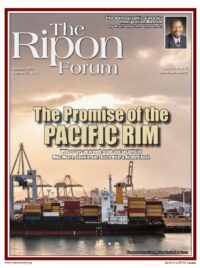
Recent trends suggest that world history is approaching another pivot period – one where a big shift in the balance of power destabilizes and even destroys the existing international order.
Germany’s rise prior to World War I is an oft-cited case of a prior pivot. A century later, the “rising power” is China, and some fear for the future of the East Asian order that the United States created after World War II and sustained ever since.
Of course, history does not follow mechanistic formulas, and past power transitions were highly complex and contingent. This one will be no exception. But if China and America are to find a mutually acceptable accommodation, it will require wisdom, skill, and luck.
Several factors give this power transition its own character.
First of all, we should speak of China’s “revival” rather than its rise, since centuries ago it was the dominant power of East Asia.
…we should speak of China’s “revival” rather than its rise, since centuries ago it was the dominant power of East Asia.
Second, China has restored lost power by accepting interdependence with the international system. By now, China is so embedded in that international system that the United States and its allies don’t have the option of containing it.
Third, the fact that China will soon have the largest gross domestic product does not mean that it will automatically become the dominant political and military power at American expense. China’s large GDP is an artifact of a large population and how production is measured (China gets credit for the total value of its export products even though it adds relatively little value to them).
Fourth, as Chinese society evolves after three decades of rapid change, its leaders face a series of policy challenges if they are to sustain economic growth, ensure social stability, and restore the tarnished legitimacy of the communist party. The default response to domestic pressures has been to stabilize the external environment rather than to disrupt it, which reduces pressure on the United States.
Finally, the trajectory of China’s military modernization is so gradual that it will not have the ability to challenge the United States on a global basis for a long, long time. It simply lacks the ability to project power the way the U.S. military has done for decades.
Indeed, a rising power usually seeks to dominate its home region first before going global. But this is easier said than done for China in its home region of East Asia. The United States has been that region’s dominant power since 1950, based on the belief that the best way to protect our national interest is to deploy our multi-faceted power across the Pacific and into East Asia’s littoral periphery (particularly through the alliances with Japan and Korea). That forward deployment created a benign environment that increased the incentives of Asian nations to focus on economic development and reduced their temptation to go to war.
…the trajectory of China’s military modernization is so gradual that it will not have the ability to challenge the United States on a global basis for a long, long time.
China itself was a beneficiary of U.S. policy once it threw off the ideological straitjacket of Maoism after 1978. As long as the United States is determined to remain in East Asia, which is the starting point of current policy, China will find it difficult to dominate its own region. (If there is regional conflict, however, Chinese forces will not suffer under the “tyranny of distance.” Their American adversaries would).
So China has choices concerning how to exercise its growing influence. It may decide to disrupt the hegemonic stability that the United States has provided, but it is not destined to do so. Its leaders appear uncertain about their ultimate goals, move forward deliberately, and have generally been averse to risk. They understand that economic prosperity and social stability still depend on economic integration with the rest of the world. That said, there are several friction points in East Asia that could, if not carefully managed, heighten tensions between China and the United States and draw them into a relationship of permanent hostility and destabilize the East Asian regional order.
The first of these issues stems from Beijing’s belief that the restoration of national greatness is impossible without national unification. The key issue here is Taiwan. From the mid-1990s to 2008, Beijing perceived that the island’s leaders were seeking de jure independence; that success in such a quest would threaten China’s fundamental interests; and that America was somehow complicit in this separatist project. The ensuing tensions created the highest risk of a U.S.-China war since the late 1950s. Fortunately, since 2008 a different leadership in Taiwan has chosen to engage China economically and eschew provocations. Many points of difference remain between Beijing and Taipei, but for now their relationship is stable and is likely to remain so unless China sees new reason to conclude that time is not on its side for achieving unification.
The second strain on U.S.-China ties stems from the commitments that Beijing and Washington have made to their respective allies, North and South Korea. China’s support for Pyongyang waxes and wanes, and its frustration at being manipulated by a small power with a penchant for recklessness has grown with time. China is in basic agreement with the United States that the North’s nuclear weapons program is dangerous and destabilizing, but Beijing is unwilling to abandon the Kim family regime all together and to remove the buffer state it represents. The current danger is that a limited, conventional military action by North Korea against South Korea will escalate out of control and draw China and the United States into a military conflict on opposite sides. The collapse of North Korea could have the same result. It appears, however, that Beijing has a greater appreciation of the danger that its ally poses and of the need to coordinate better with the United States and South Korea.
Third, over the last 15 years, China has sought gradually to push out its strategic perimeter from its eastern and southern coasts. If it had to stop a Taiwan move to independence, it would need to at least complicate U.S. intervention. Beijing believes that the East and South China Seas have plentiful natural resources (hydrocarbons, minerals, and fish). So it has claimed landforms in those seas, and, to assert those claims, it has enhanced the capabilities of its naval, air force, and law enforcement units. The problem is that American allies also claim some of those landforms, and Chinese maritime units increasingly operate in areas where the U.S. and Japanese navies have traditionally been dominant. Moreover, China’s rather aggressive behavior in asserting maritime claims has increased regional tensions and placed it at odds with the United States. There are probably conflict-avoidance and risk-reduction measures that the claimant states could adopt to reduce the chance of physical clashes and a wider conflict, but Beijing has yet to summon the political will to do so.
The chance that war between the United States and China might result from conflicts in any one of these cases is low. Each side understands the stakes involved, and there are means available to reduce the risks even further. Still, the probability of military conflict is not zero, and its consequences would be profound. Toxic Chinese nationalism can limit Beijing’s options. And if these problems are not well managed in the absence of war, they can foster tensions between Washington and Beijing that will cumulatively lead each capital to conclude that the other’s long-term intentions toward it are hostile and to act on those perceptions. Neither would have intended permanent rivalry, but it would happen anyway.
Still, the probability of military conflict is not zero, and its consequences would be profound.
It is not just security issues that could produce permanent rivalry. Economic disagreements can as well. On balance, U.S.-China economic ties have been mutually beneficial over the last 30-plus years. Yet that has obscured a rather fundamental disagreement over the fruits of commercial innovation. For American firms, intellectual property (IP) is their most precious asset and the basis of future success. For the United States as a whole, encouraging innovation and protecting its fruits are the keys to future growth. But Chinese economic entities, lacking the means to do technology innovation, have engaged in a consistent pattern of theft of IP from the United States and other advanced economies. The Chinese central government has made commitments to protect the intellectual property rights of foreign firms, but have never been able to implement those commitments well. This pattern has taken a new turn recently, as Chinese entities use cyber capabilities to steal foreign IP. For American firms, the perception grows that economic relations with China are no longer beneficial.
If rivalry is to be avoided, several steps are necessary. American and Chinese leaders must have a shared understanding of the value of cooperation and the need to manage points of friction, especially in East Asia. Each leadership must shape negative domestic public opinion towards the other country so that it does not undermine bilateral ties. And each must ensure that the commitments it makes to the other are carried out effectively (otherwise, suspicion results).
Finally, if the United States is to encourage Chinese accommodation, it must itself rebuild the pillars of national power that have been allowed to atrophy over the last few decades. These include a sound education system, support for science and technological innovation, fiscal balance, and a competent civil service. These in turn will require an effective political system.
Without these reforms, China will have little incentive to accommodate to the United States and more reason to challenge it. In a rather fundamental way, America’s future vis-à-vis a reviving China is in its own hands.
Richard Bush is a Senior Fellow and the Director of the Center for Northeast Asian Policy Studies at The Brookings Institution.




